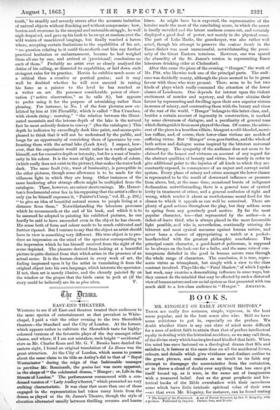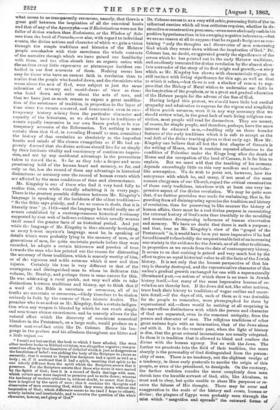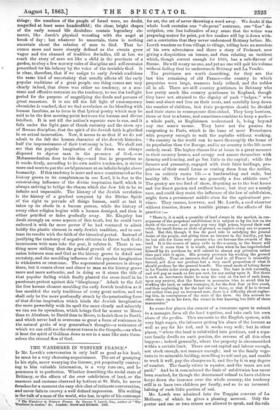BOOKS.
MR KINGSLEY ON EARLY JEWISH HISTORY.*
THESE are really fine sermons, simple, vigorous, in the best sense popular, and in the best sense also wise. Still we have some criticisms to put in, especially on the preface. We doubt whether there is any one state of mind more difficult for a man of ardent faith to attain than that of perfect intellectual equity in dealing with the historical accidents, as we may call them, of the divine story which has inspired and kindled that faith. When the mind has once fastened on a theological drama that fills and satisfies it, it fastens at the same time on all the accidental forme, colours, and details which give vividness and distinct outline to the great picture, and resents as an insult to its faith any attempt to disengage the uncertainties from the certainties, or to throw a cloud of doubt over anything that has once got itself bound up, as it were, in the same act of imagination with a treasured belief. Just as the great prophetic and his- torical books of the Bible overshadow with their sacredness some which have little intrinsic spiritual value of their own —so that even Mr. Kingsley, for instance, can be found stating • The Gospel of the Pentateuch. A set of Parish Sermons, by Rev. C. King.ley, with a preface. Published by request. Parker, Son, and bum,
what seems to us transparently erroneous, namely, that there is a great gulf between the inspiration of all the canonical books and that of any of the Apocrypha—as if Ecctesiastieus were not far fuller of divine wisdom than Ecclesiastes, or the Wisdom of Solo- mon than the book of Proverbs,—.30 also, with regard to individual events, the divine actions and character of which we gain a vision through the simple traditions and histories of the Hebrew people overshadow with their sacredness the whole contents of the narrative through which we have gained our familiarity with them, and too often absorb into an organic union with themselves every little expressive or picturesque incident em- bodied in on first accounts of them. Nothing seems less easy for those who have an earnest faith in revelation than to realize that the people who handed down, and the chroniclers who wrote about the acts of Gad, were subject to just the same infirmities of memory and onesidsdnes; of view as those who hand down and write about the acts of men, and that we have just as much reason to expect a great modifica- tion of the substance of tradition, in proportion to the lapse of time since Vie events occurred, and inaccuracies even in coa- tsmperary history arising from the particular character and capacity of the historians, as we should have in traditions of events equally impressive in our own Saxon period, or in con temporary accounts of the Reformation. Yet nothing is more certain than that Gad, in revealing Himself to man, committed the history of that revelation as absolutely to the imperfect hearts and minds of His chosen evangelists as if He had ex- pressly dacreed that the divine actions should live for us simply by thoir intrinsic vitality and consistency of continuous impres- sion, and not by any accidental advantage in the precautions taken to record then. S far as they take a deeper and more penetrating hold of the human heart and memory, so far, and only so far, has the record of them any advantage in historical distinctness or accuracy over the record of human events which are affected by the same conditions of time and circumstance.
Mr. Kingsley is one of those who find it very hard fully to realize this, even while virtually admitting it in every page.
There is the greatest possible difference between Mr. Kingsley's language in speaking of the incidents of the oldest traditions- ." So the Bible says plainly, and I see no reason to doubt, that it is literally true" (p. 116)—and the language he would really use of events established by a contemporaneous historical testimony supported by that web of indirect evidence which usually weaves itself round the greater facts of an historical period. And yet while the language of Mr. Kingsley is thus sincerely hesitating, as every henest inquirer's language must be, in speaking of details which were probably lying in the memory of men, or of generations of men, for quite uncertain periods before they were recorded, he adopts a certain bitterness and passion of tone towards the man who has pointed out the reason for distrusting the accuracy of these traditions, which is scarcely worthy of him, or of the vigorous and noble sermons which it now and then injures. Certainly his tone is very different to that of the courageous and distinguished man to whom he dedicates this volume, Dr. Stanley, and perhaps there is some excuse for this. He was addressing a rural parish, not very well able to take distinctions between traditions and history, apt to think that if a word of the Bible is uncertain or erroneous, all of its truths are uncertain or erroneous,—likely therefore to be shaken seriously in faith by the rumour of these historic doubts. The preacher who is so ardent as Mr. Kingsley, feels a certain indigna- tion when any weapon is blunted by which lie can reach simple and sometimes obtuse consciences, and he scarcely allows for the natural effect which the discovery of consistent numerical blunders in the Pentateuch, on a large scale, would produce on a rather matter-of-fact critic like Dr. Colenso. Hence his lan- guage in the preface and his allusions throughout are bitter and a little unjust :—
" I could not but see that the book to which I have alluded, like most other modern books on Biblical criticism, was altogether negative ; was pos- sessed too often by that fanaticism of disbelief which is just as dangerous as the fanaticism of belief; was picking the body of the Scripture to pieces so -earnestly, that it seemed to forget that Scripture had a spirit as well as a body ; or, if it confessed that it had a spirit, asserting that spirit to be one utterly different from the spirit which the Scripture asserts that it possesses. For the Scripture asserts that those who wrote it were moved by the Spirit of God; that it is a record of God's dealings with men, which certain men were inspired to perceive and to write down ; whereas the tendency of modern criticism is, without doubt, to assert that Scrip- ture is inspired by the spirit of man ; that it contains the thoughts and discoveries of men concerning God, which they wrote down without the inspiration of God ; which difference seems to me (and I hope to others), utterly infinite and incalculable, and to involve the question of the whole character, honour, and glory of God!'
Dr. Colenso seems to us a very wild critic, possessing little of the in- tellectual caution which all true criticism requires, whether in de- structive or constructive processes,--even more obviously rash in his positive hypotheses than in his sweeping negative inferences,—but we see no reason at all to suppose that he regards Scripture as con- taining "only the thoughts anl discoveries of men concerning God which they wrote down without the inspiration of God." Dr. Colenso has, no doubt, exaggerated greatly the significance of the errors which he has pointed out in the early Hebrew traditions, and needlessly truncated the divine revelation by the almost abso- lute surrender of the story of its first origin and growth,—a story which, as Mr. Kingsley has shown with characteristic vigour, is still instinct with living significance for this age, as well as that to which it refers,—but there is not a shadow of reason t3 sup- pose that the Bishop of Natal wishes to undermine our faith in the inspiration of the prophets, or in a great and gradual education of the Hebrew people for the advent of the Son of God.
Having lodged this protest, we &maid have little but cordial sympathy and admiration to express for the vigour and simplicity of these parish sermons, were it in any way necessary that we should review what, in the great lack of such living religious con- viction, most people will read for themselves. They are meant, of course, for simple people, and therefore, perhaps, have the more interest for educated mcn,—dwelling only on those broader features of the early traditions which it is safe to accept as the real drift of the divine teaching given to that early age. How Mr. Kingsley can believe that all but the first chapter of Genesis is the writing of Moses, when it contains repeated allusions to the condition of Palestine under the Kings long after the death of Moses and the occupation of the land of Canaan, it is for him to explain. But we must add that the teaching of his sermons depends exceedingly little on this very needless and uuscholar- like assumption. We do wish to point out, however, how the annoyance with which he, and many, if not most of the most earnest clergymen of our Church, regard the critical examination of those early traditions, interferes with at least one very im- pressive aspect of the divine revelation. We may be quite sure that, if no further provision was made for embalming, that is, for guarding from all disintegrating agencies the tradition and history of revelation, than for preserving in like manner the history of human affairs, there must be a real divine purpose in committing the external history of God's acts thus trustfully to the moulding and sometimes decomposing influences of human observation and memory. We have no doubt that there is such a purpose ; and that, true as Mr. Kingsley's view of the "gospel of the Pentateuch" is, it would have been yet more impressive if he had forcedhimself to faceboldly the unquestionable fact of an increasing uncertainty in the evidence for the Jewish, as of all other traditions, in proportion as we recede from the date of contemporary history.
It seems to us that nothing is gained and very much lost by the effort to give an equal historical value to all the facts of the Jewish history. It is not only that the human perspective of that his tory is thereby destroyed, and the representative character of this nation's gradual growth exchanged for one with a supernaturally illuminated past,—a notion of which there is no trace in Jewish.
history itself,—bnt many of the most impressive lessons of re- velation are thereby lost. If the Jews did not, like other nations, trace back their history to traditions of vague outline and uncer- tain detail,—if the days of old, such of them as it was desirable for the people to remember, were photographed for them by supernatural aid,—there would be nothing at all surprising in the marvellous distinctness with which the person and character of God are separated, even in the remotest antiquity, front the person and character of man. The religious traditions of other great nations begin with an incarnation, that of the Jews alone end with it. It is to the remote past, when the light of history is dim, that the great oriental incarnations are usually relegated.
In them it is tradition that is allowed to blend and confuse the divine with the human agency. Not so with the Jews. The farther we penetrate into the field of their tradition, the more sharply is the personality of God distinguished from the person- ality of man. There is no tendency, not the slightest vestige of a tendency, in those early pastorals to ascribe the origin of this people, or even of the priesthood, to demigods. On the contrary, the farther tradition recedes the more completely does man shrink into the humble servant of God, able, like Abraham, to trust and to obey, but quite unable to share His purposes or re-
ceive the fulness of His thought. There may be error and exaggeration in the scale of the history and events, human or divine ; the plagues of Egypt were probably seen through the mist which "magnifies and spreads" the outward forma of // things ; the numbers of the people of Israel were, no doubt, magnified at least some hundredfold ; the clear, bright shapes of the early nomad life doubtless contain legendary ele- ments, like Jacob's physical wrestling with the angel at break of day ; but whatever be uncertain, there is nothing uncertain about the relation of man to God. That be- comes more and more sharply defined as the events grow vague and the channel of tradition dwindles, till at last we reach the story of man set like a child in the precincts of a garden, to obey a few nursery rules of discipline and self-restraint prescribed for his infancy by the voice of the invisible God. It is clear, therefore, that if we assign to early Jewish traditions the same kind of uncertainty that usually affects all the early popular traditions of a great people, one thing comes out very clearly indeed, that there. was either no tendency, or a con- stant and effective restraint on the tendency, to use the twilight period for the purpose of magnifying the deeds and persons of great ancestors. It is not till the full light of contemporary chronicles is reached, that we find revelation so far blending with human faculties, as to issue in that lyrical poetry which may be said to be the first meeting-point between the human and divine intellect. It is not till the nation's separate race is run, and it falls under the light gaze of Greek curiosity and the stern eye of Roman discipline, that the spirit of the Jewish faith is glorified in an actual incarnation. Now, it seems to us that if we do not admit to the full the human character of the Jewish histories, half the impressiveness of their testimony is lost. We shall not see that the popular imagination of the Jews was always disposed to depress man in the presence of God, — as Mohammedanism does to this day,—and that in proportion as it works freely, according to its own native tendencies, it strives more and more to put the awful presence at an infinite height above humanity. If this tendency is more and more counteracted as the history grows to its completeness in our Lord, it is due to the constraining influence of the divine inspiration itself, which is always striving to bridge the chasm which the Jew felt to be so infinite and impassable. The history of the Jewish revelation is the history of a gradual conquest by the Divine Spirit of the right to pervade all things human, until at last it takes up its abode in a human person, while the history of every other religion begins with a human demigod, and then is either petrified or fades gradually away. Mr. Kingsley has dwelt strongly on some aspects of this truth, but he could have enforced it with far more power if he had ventured to admit boldly the plastic element in early Jewish tradition, and to con- trast its results with the faith of the historical period. Instead of justifying the tendency of negative criticism to throw back God's intercourse with man into the past, it refutes it. There is no- thing more striking than the gradual growth of the mysterious union between man and God as the history grows in detail and certainty, and the moulding influence of the popular imagination is withdrawn or overcome. The supernatural presence is always there, but it comes closer and closer to man as the history grows more and more authentic, and in doing so it stems the tide of that popular feeling which finally planted the cross itself in its passionate protest against this "blasphemy." Admit to the full the free human element moulding the early Jewish tradition as it has moulded the early traditions of every great nation, and we shall only be the more profoundly struck by the penetrating force of that divine inspiration which binds the Jewish imagination the more powerfully with its spell the more clearly and minutely we can see its operations, which brings God far nearer to Moses than to Abraham, to David than to Moses, to Isaiah than to David, and which never had to overcome so great a force of resistance in the natural grain of any generation's thought—a resistance of which we can still see the clearest traces in the Gospels,—as when it bent the spirit of Galilean Jews to see in a man like unto them- selves the eternal Son of God.
































 Previous page
Previous page